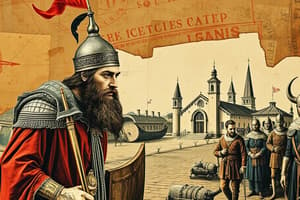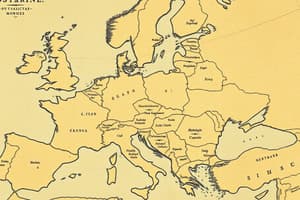Podcast
Questions and Answers
Which event marked the fall of the Western Roman Empire?
Which event marked the fall of the Western Roman Empire?
- The establishment of the feudal system
- The unification of the Ostrogoths
- The rise of the Franks
- The sack of Rome in 410 CE (correct)
What was a key feature of the new kingdoms in Europe?
What was a key feature of the new kingdoms in Europe?
- A powerful monarch ruling over a unified kingdom
- Decentralized power held by local lords and nobles (correct)
- A strong centralized government
- A thriving trade and commerce
Which king converted to Christianity and unified the Franks?
Which king converted to Christianity and unified the Franks?
- Charlemagne
- Alaric
- Clovis I (correct)
- Theodoric the Great
What was the main consequence of the rise of new kingdoms in Europe?
What was the main consequence of the rise of new kingdoms in Europe?
Which of the following kingdoms was established in North Africa?
Which of the following kingdoms was established in North Africa?
What was the role of monasteries and Christian scholars in the new kingdoms?
What was the role of monasteries and Christian scholars in the new kingdoms?
Flashcards are hidden until you start studying
Study Notes
Rise of New Kingdoms
- 6th century: Following the fall of the Western Roman Empire, new kingdoms emerged in Europe.
- Barbarian Kingdoms: Established by Germanic tribes, these kingdoms were:
- Visigoths (Spain and Portugal)
- Vandals (North Africa)
- Ostrogoths (Italy)
- Franks (France and Germany)
- Anglo-Saxons (England)
Key Features of New Kingdoms
- Decentralized Power: Power was held by local lords and nobles, rather than a central authority.
- Feudal System: Lords granted land to vassals in exchange for military service and loyalty.
- Limited Trade and Commerce: Trade declined, and economies became largely self-sufficient.
- Christianity: Christian missionaries converted many of the new kingdoms to Christianity.
Important Rulers and Kingdoms
- Clovis I (Franks): Unified the Franks, established Paris as capital, and converted to Christianity.
- Theodoric the Great (Ostrogoths): Ruled Italy, promoted religious tolerance, and encouraged cultural achievements.
- Alaric (Visigoths): Sacked Rome in 410 CE, marking the fall of the Western Roman Empire.
Impact of New Kingdoms
- Shaped Medieval Europe: The new kingdoms laid the foundation for the development of medieval Europe.
- Preserved Classical Knowledge: Monasteries and Christian scholars preserved classical knowledge, which would later influence the Renaissance.
Rise of New Kingdoms
- Following the fall of the Western Roman Empire in the 6th century, new kingdoms emerged in Europe.
- These kingdoms were established by Germanic tribes, including:
- Visigoths, who founded a kingdom in Spain and Portugal.
- Vandals, who established a kingdom in North Africa.
- Ostrogoths, who founded a kingdom in Italy.
- Franks, who established a kingdom in France and Germany.
- Anglo-Saxons, who founded a kingdom in England.
Key Features of New Kingdoms
- Decentralized power characterized these new kingdoms, with local lords and nobles holding significant power.
- The feudal system emerged, where lords granted land to vassals in exchange for military service and loyalty.
- Limited trade and commerce occurred, with economies becoming largely self-sufficient.
- Christianity spread throughout the new kingdoms, with Christian missionaries converting many of the new kingdoms.
Important Rulers and Kingdoms
- Clovis I, king of the Franks, unified the Franks, established Paris as the capital, and converted to Christianity.
- Theodoric the Great, king of the Ostrogoths, ruled Italy, promoted religious tolerance, and encouraged cultural achievements.
- Alaric, king of the Visigoths, sacked Rome in 410 CE, marking the fall of the Western Roman Empire.
Impact of New Kingdoms
- The new kingdoms laid the foundation for the development of medieval Europe.
- Monasteries and Christian scholars preserved classical knowledge, which would later influence the Renaissance.
Studying That Suits You
Use AI to generate personalized quizzes and flashcards to suit your learning preferences.





